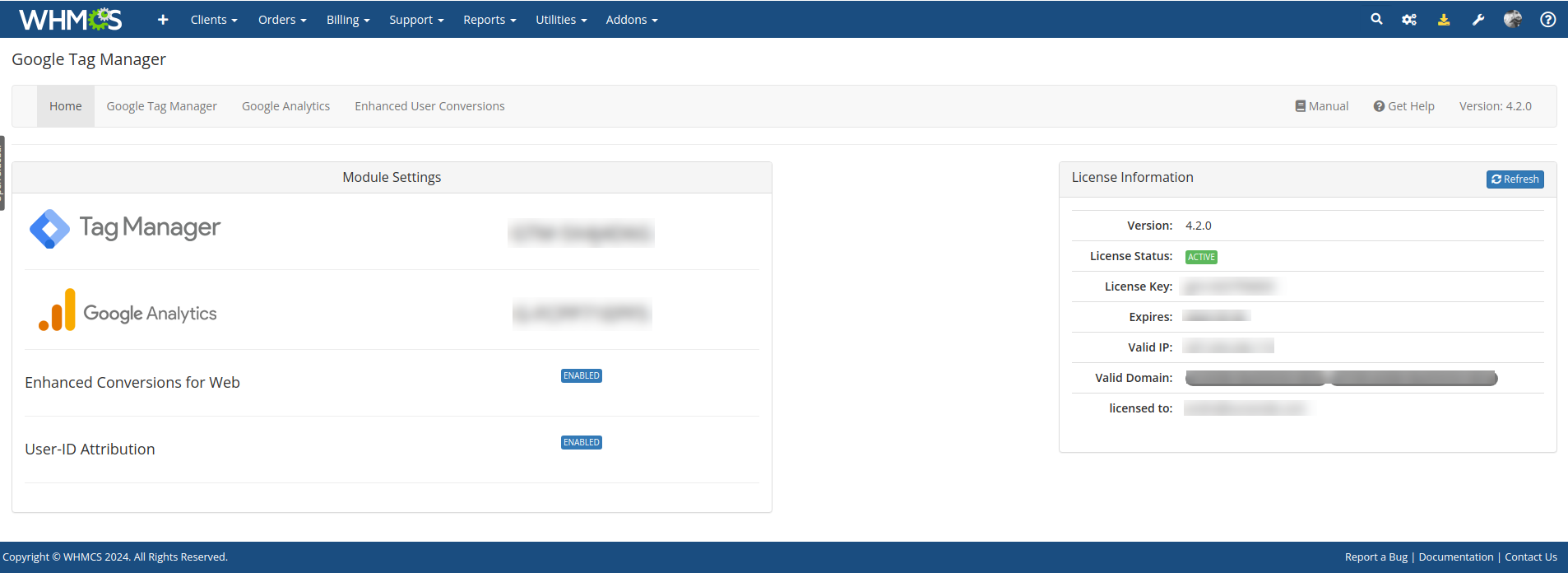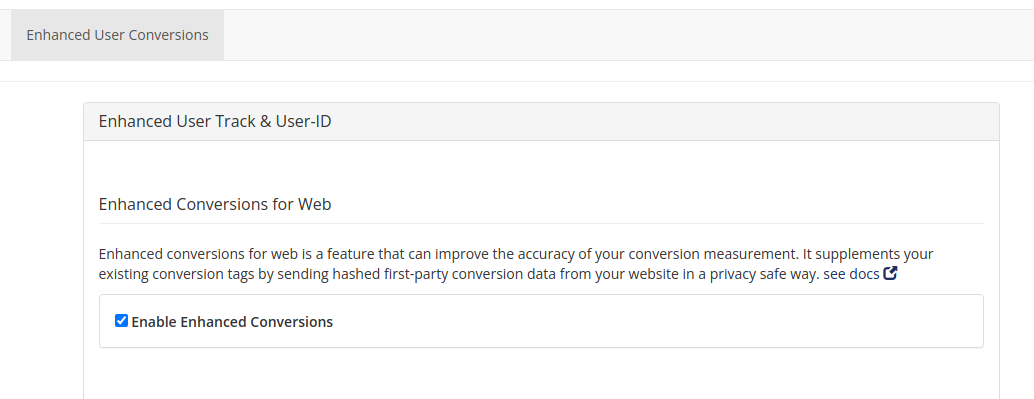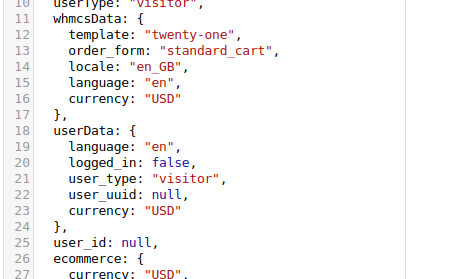4.2
4.2.1
- Release date:
2024-04-30 - Release type:
Fix
Fixes
- Fixed an issue in the domain price data layer that could lead to page display failure in certain cases.
4.2.0
- Release date:
2024-04-14 - Release type:
General Availability
Google Tag Manager for WHMCS v4.2.0 is a major release that introduces new features, improvements, and deprecations. This release is focused on enhancing the tracking capabilities of WHMCS with Google Tag Manager to embrace new properties and configurations available in latest releases of Google Marketing services.

Further links:
- What's new in WHMCS GTM v4.2 - https://www.mimirtech.co/whats-new-in-whmcs-gtm-v4-2/
- Update announcement - https://manage.mimirtech.co/announcements/62/Update-Available-Google-Tag-Manager-for-WHMCS-v4.2.0.html
New Features
Enhanced Conversions for Web
This release introduces enhanced conversions for web, a new feature available in Google Ads that allows to track conversions more accurately and efficiently. Enhanced conversions for web is a new way to track conversions that uses first-party data provided in Data Layer by WHMCS GTM module.
This feature consist of new Data Layer objects that feed defined variables that can be used in tags to leverage first-party user data processing and enhanced conversions tracking.
Google Ads users will benefit from this feature that will enable advanced conversion reports and attribution models that will help to optimize campaigns and improve ROI. Remarketing campaigns will also benefit from this feature by providing more accurate data to target users that have interacted with any checkout event.

User ID Attribution
This release introduces User ID attribution, a new feature that allows to track users across devices and sessions by assigning the unique WHMCS customer identification to a pre-defined Data Layer parameter recognized by Google Services.
This feature also making possible to define the User ID strategy by selecting the value to be used, the customer ID or UUID.

Promotion Attribution
This release introduces new parameters promotion_id and promotion_name in e-commerce event layers. This will feed GA4 Promotions report with coupon id and promotion name that will help to visualize the purchase funnels that used discount coupons.

This feature do not replace the coupon parameter, that still available in Data Layer and used with GA4 Explore resource.
User Events
This release introduces new user events that will help to track user interactions with WHMCS. The new events are:
login: to identify when a user logs in to WHMCS.sign_up: to identify when a user registers on WHMCS.ticket_open: to identify when a ticket is opened on WHMCS.ticket_close: to identify when a ticket is closed on WHMCS.
These events will be present when the user perform such actions on WHMCS and will be available in Data Layer to be used in tags and triggers.

The login and sign_up events receives automatic attributions by GA4 as they names are recognized as standard events. The ticket_open and ticket_close events are custom events that can be used to track user interactions with tickets.
Customer Data Layer Object
By enabling the Enhanced Conversions for Web feature, a new Data Layer object is introduced to store customer data that will be used to enhance conversions tracking. This object will store customer data such as name, email, phone, address, and other information that will be hashed and sent to Google to match with user accounts.
Besides Google conversion tracking, this object can be used to feed other tags and triggers that need customer data to be processed.
To see the full list of parameters available in Customer Data Layer object, please refer to the Customer Variables documentation.
User Data Layer Object
A new Data Layer object is introduced to store user data in replacement of some non-standard parameters that were used in previous versions. This object will store user data such as if user is logged in, language, user currency, and other information that can be used to enhance user tracking and attribution.

To see the full list of parameters available in User Data Layer object, please refer to the User Variables documentation.
WHMCS Data Layer Object
A new Data Layer object is introduced to store WHMCS data in replacement of some non-standard parameters that were used in previous versions. This object will store WHMCS data such as template name, order form name, selected currency, and other information that can be used to enhance tracking and attribution.
To see the full list of parameters available in WHMCS Data Layer object, please refer to the WHMCS Variables documentation.
Google Tag Manager
This release brings a complete refactoring of the Google Tag Manager to reflect the new capabilities and configurations available in Google Analytics 4, Google Tag and Google Marketing services.
Container Template
This release a simplified configuration process through the possibility of importing a pre-configured container template. This template contains all the necessary tags, triggers, and variables to track WHMCS events and user interactions.
Container Tags
The container tags was refactored to reflect the new configurations and properties available in Google Analytics 4 and also the new user properties of Google Tag and Google Ads.
Most of the tags was replaced comparing to previous versions, and new tags was introduced to track new events and user interactions.
Data Layer Variables
Data Layer variables was completely refactored to reflect the new Data Layer objects and parameters available in this release. The module documentation covers all the new variables and how to use them in tags and triggers.
Container Triggers
Container triggers was remodeled to cover new events and user interactions available in this release. Existing triggers received new names to better organization and semantic.
Improvements
- The module file size was reduced by half due refactoring and removal of GA3 libraries and codes.
- Page load time impact in some cases when module can't verify your expiration was ceased.
Deprecations
Google Analytics 3
Google Analytics 3 was deprecated and removed from the module. Now all events and parameters are only compatible with Google Analytics 4 and Google Tag.
Data Layer Parameters
In v4.2 some Data Layer parameters were deprecated and replaced by new objects. The following parameters were deprecated:
languagelocaletemplatepageTitleuserTypeloggedincurrency(will still be present but not referenced by variables)
These parameters don't exist anymore in container variables even used on any tag.
Events
The event adsConversion was deprecated and replaced by purchase event that now contains all information needed to track Google Ads conversions.
Documentation
The project has undergone a significant update, particularly in relation to Google Tag. The Global Tag site and GA property have been updated to Google Tag, and the documentation has been revised to reflect the new references and configurations available in Google Analytics and Tag Manager.
The documentation has been thoroughly improved to mirror the new configurations and properties available in Google Analytics 4, as well as the new user properties of Google Tag and Google Ads. This enhancement ensures that the documentation is up-to-date and provides accurate information.
With the end of support and availability for GA 3, all references to it have been removed from the documentation. This change ensures that the documentation remains relevant and avoids confusion for users.
The documentation has been restructured to accommodate the new requirements of version 4.2 and to archive the documentation of version 4.1 for historical purposes. The legacy version's documentation can still be accessed via the provided link.
The sidebar has been updated to display sections related to each documented module. Now, when a module's documentation is selected, only the sections relevant to that documentation are displayed. This update makes navigation and reading of the documentation more fluid and objective.
The changelog has been restructured for better organization and readability. Now, versions and their changes are centralized in major and minor versions, and corrections and improvements are listed in topics. This restructuring makes it easier for users to understand the changes made in each version.